The European Central Bank (ECB) has predicted "very strong" wage growth "compared with historical patterns" over the next few quarters as salaries begin to catch up with the eurozone's soaring inflation rate, Belga News Agency has reported.
In a report published on Monday, the ECB identified the principal causes of the expected wage growth as the eurozone's "robust labour markets" coupled with "increases in national minimum wages".
The report further noted that, as a direct consequence of high inflation, real wages "are now substantially lower than before the [Covid-19] pandemic". This "could lead trade unions to demand higher wage increases in upcoming negotiation rounds, especially in sectors with lower wages".
No room for (long-term) optimism
Despite the expected short-term increases in salaries, the ECB was largely pessimistic about the eurozone's prospects for medium to long-term wage growth. In particular, it noted that "beyond the near term, the expected economic slowdown in the euro area and uncertainty about the economic outlook are likely to put downward pressure on wage growth".
The eurozone's annual inflation rate fell to 9.2% in December, down from 10.1% in November: the second month in a row that inflation has declined, after a year-and-a-half of uninterrupted increases — but still well above the ECB's target rate of 2%.
Moreover, the continued increase in 'core' inflation — which strips away the impact of energy prices and unprocessed food on the overall inflation rate — as well as a possible surge in energy prices precipitated by another cold snap, have led some economists to expect overall inflation to pick up again in the near future.
"Despite the stabilisation of energy prices, we will see price increases for at least a few more months," Philippe Ledent, a Senior Economist at ING Bank, told l'Echo last month.
Such economic forces could well see wages fall further behind the euro area's inflation rate in 2023, which the ECB predicts will average 6.3%.
Related News
- European Central Bank raises interest rate by 0.5 percentage point
- 'Tough year': IMF predicts half of EU to be in recession in 2023
To tame the bloc's soaring inflation, the ECB raised its interest rates four times last year, with its key rate now set at 2.5%. At its last rate increase in December, ECB President Christine Lagarde emphasised that the bank's monetary stance would remain hawkish for the foreseeable future and warned of rising interest rates "because inflation remains far too high and is projected to stay above our target for too long".
In a speech delivered at the European Parliament in November, Lagarde also warned about the "self-defeating" nature of a so-called "wage-price spiral", whereby wage rises lead to a surge in prices which then leads to more demand for further wage increases.
"Persistently high inflation could lead to de-anchored inflation expectations, which then become ingrained in wage negotiations and price setting," she cautioned.
Europe's elevated inflation rate — and, in particular, its soaring prices for food and energy — were largely precipitated by Russia's invasion of Ukraine in February this year, which subsequently induced a severe cost of living crisis throughout the continent and, indeed, much of the rest of the world.

